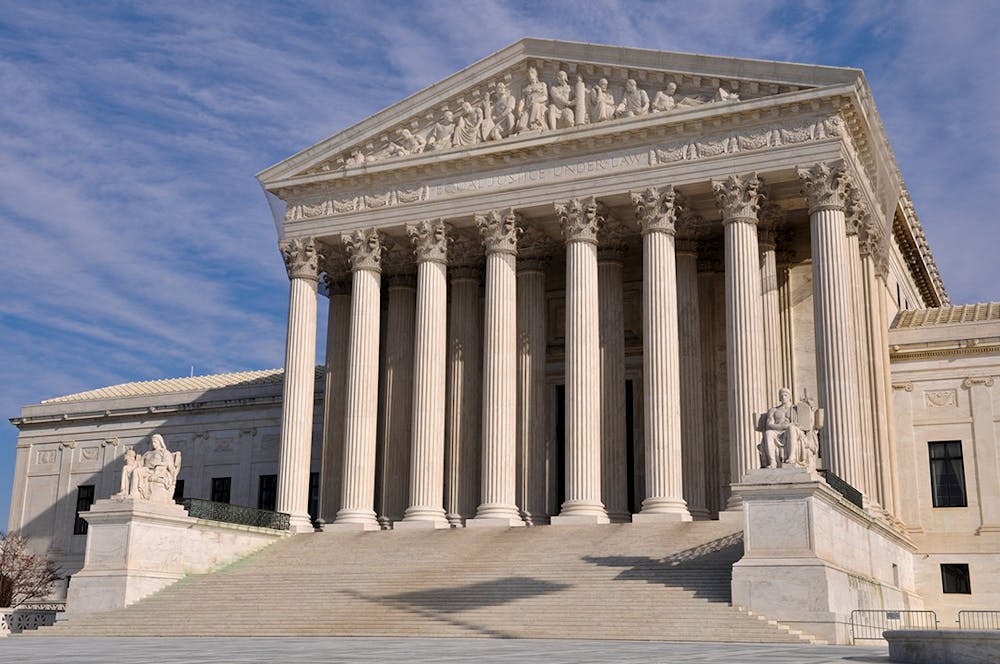Ruth Bader Ginsberg's seat on the Supreme Court should be determined by the next president.
Amy Coney Barrett, the current nominee, will try to bring Christianity into law, creating stricter laws and disregarding any other religion in the United States. Barrett would be the youngest justice on the bench and could be on the courts for the next 50 years, affecting a large part of our lives. So vote, learn about candidates currently running for office and think about others who are minorities or who don’t follow the same religion. This is our future, and we have the chance to change it.
On Sept. 18, the world watched as Supreme Court Justice Ruth Bader Ginsburg passed away, leaving minorities terrified of what might come next.
The Supreme Court consists of nine justices. Now, the court sits with four conservatives, two judges in the middle and two liberals. This means if President Donald Trump is allowed to nominate a candidate, conservatives will rule the court.
The courts are in charge of interpreting laws. They decide what is right and wrong. With an overpowering conservative vote, more liberal laws such as abortion and LGBTQIA+ rights could be at risk.
Usually, when a justice passes or retires, the president can appoint his candidate, and the vote would go to the Senate. However, what makes this case interesting is the upcoming election.
Many people have questioned whether the Senate should vote on Trump’s nominee. The answer should be no, not only because of RBG's dying wish that her seat remain open until after the election, but because the same thing happened to former President Barack Obama.
In 2016, Sen. Mitch McConnell declared Obama's appointment null and said the justice will be picked by the following president because it was too close to the election. The difference is that, in his case, it was eight months before the election, and this is 30 days before the election.
"I think maybe if Obama had been allowed to nominate a candidate it would be fine for Trump to do so, but since the Senate had rejected Obama's nominate and said his nomination was too close to the election eight months beforehand, and this is only 40 days before the election, I think the hypocrisy is ridiculous, and the nomination shouldn't be considered," Shelby Bowers, a first-year history student, said.
Trump supporters will do what they want to get ahead.
“I want you to use my words against me. If there's a Republican president in 2016 and a vacancy occurs in the last year of the first term, you can say Lindsey Graham said let's let the next president, whoever it might be, make that nomination," South Carolina Sen. Lindsey Graham said in a 2016 video.
But now, Graham is in full support of Trump's nomination.
“Honestly, I feel like it could possibly affect my future, especially when it comes to abortion and laws against pregnancy and such. Especially when it comes to birth control and things of that nature, I’m a little nervous as a woman and a woman of color. I want to know again what are her policies that she brings to help people of color and minorities,” first-year public health student Elicia Ward said.
If the courts were to go conservative, the fear is what comes next in regard to progressive laws. Although Barrett has said personal faith should not be applied while practicing law, she's not going to separate church and state and will be bringing religion somewhere it shouldn't be. The Republican party is ready to put restrictions on abortion, birth control, same-sex marriage and other progressive laws meant to follow the 14th Amendment and treat people equally.
There are ways to stop this vote from happening. You can call your local representatives or local officials, write to Congress and sign petitions. If they get enough signatures, officials have to look at it. The one linked here is to stop the vote. If you want change, take action.

